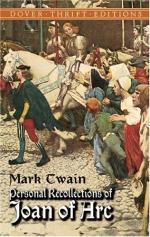13 The Third Trial Fails
So the second trial in the prison was over. Over, and no definite result. The character of it I have described to you. It was baser in one particular than the previous one; for this time the charges had not been communicated to Joan, therefore she had been obliged to fight in the dark.
There was no opportunity to do any thinking beforehand; there was no foreseeing what traps might be set, and no way to prepare for them. Truly it was a shabby advantage to take of a girl situated as this one was. One day, during the course of it, an able lawyer of Normandy, Maetre Lohier, happened to be in Rouen, and I will give you his opinion of that trial, so that you may see that I have been honest with you, and that my partisanship has not made me deceive you as to its unfair and illegal character. Cauchon showed Lohier the proces and asked his opinion about the trial. Now this was the opinion which he gave to Cauchon. He said that the whole thing was null and void; for these reasons: 1, because the trial was secret, and full freedom of speech and action on the part of those present not possible; 2, because the trial touched the honor of the King of France, yet he was not summoned to defend himself, nor any one appointed to represent him; 3, because the charges against the prisoner were not communicated to her; 4, because the accused, although young and simple, had been forced to defend her cause without help of counsel, notwithstanding she had so much at stake.
Did that please Bishop Cauchon? It did not. He burst out upon Lohier with the most savage cursings, and swore he would have him drowned. Lohier escaped from Rouen and got out of France with all speed, and so saved his life.
Well, as I have said, the second trial was over, without definite result. But Cauchon did not give up. He could trump up another. And still another and another, if necessary. He had the half-promise of an enormous prize—the Archbishopric of Rouen—if he should succeed in burning the body and damning to hell the soul of this young girl who had never done him any harm; and such a prize as that, to a man like the Bishop of Beauvais, was worth the burning and damning of fifty harmless girls, let alone one.
So he set to work again straight off next day; and with high confidence, too, intimating with brutal cheerfulness that he should succeed this time. It took him and the other scavengers nine days to dig matter enough out of Joan’s testimony and their own inventions to build up the new mass of charges. And it was a formidable mass indeed, for it numbered sixty-six articles.
This huge document was carried to the castle the next day, March 27th; and there, before a dozen carefully selected judges, the new trial was begun.
Opinions were taken, and the tribunal decided that Joan should hear the articles read this time.




